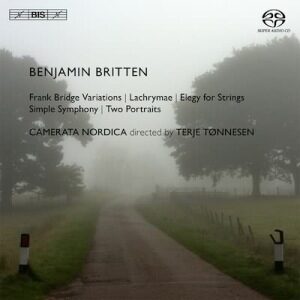The Benjamin Britten 100th birthday year couldn’t have been a tougher one for fans and collectors of the composer’s music: how to choose from (or pay for) the tons of tempting recordings, from re-packaged boxed set reissues to new performances, often containing previously unpublished, unheard, unrecorded works? Well, here’s another one guaranteed to discombobulate your budget. From Sweden’s Camerata Nordica come these sonically vibrant, technically poised, musically captivating performances of Britten works for string orchestra, from the classic Variations on a Theme of Frank Bridge, Simple Symphony, and Lachrymae (in the late version for viola and strings), to the lesser-known Two Portraits and the apparently previously unrecorded Elegy for Strings.
Besides Britten’s matchless recording of the Bridge Variations on Decca with the English Chamber Orchestra, my previous, closely competing reference was the one by the Amsterdam Sinfonietta on Channel Classics, which is nearest to the composer’s in sheer dynamic intensity and what you would describe as “technicolor” string effects if there were such a thing (read review here). This one travels in the same lauded company, with similarly dynamic, authoritative direction and gritty, spontaneous, extroverted orchestral playing–and, importantly, presented in sound that (as with the Channel Classics recording) may “knock you sideways” (to use one of Britten’s own expressions). One example is in the “March” movement, where the brief bursts of pizzicato seem to jump out and pluck you on the ear (the same applies to the longer pizzicato passages in the Lachrymae). String timbres are as realistic and ensemble presence is as immediate as recordings can convey them. Other highlights of the Bridge Variations are the “Wiener Walzer”, where Terje Tønnesen and his players perfectly capture the movement’s delightfully profane, vulgar character, and the “Funeral March”, with its profoundly spooky low strings’ relentless, insistent chant of doom.
The Simple Symphony is masterfully done–and it features what may be the most faithful-to-the-score rendition of the “Playful Pizzicato” movement on disc, and that includes Britten’s own version. Tønnesen takes the composer’s marking of “molto pesante” in the movement’s Trio section fully to heart, not just by playing “heavier” but making the heaviness even more effective by slowing the tempo–a valid interpretive decision that also makes the contrast between the movement’s two sections even more dramatic–and memorable. Violist Catherine Bullock’s rendition of Lachrymae reminds us again of what a fine work this is–and she returns in the second of the so-called Two Portraits for string orchestra, pieces Britten wrote when he was 17. These are remarkably sophisticated works that, similar in concept but completely different in musical invention from Elgar’s Enigma Variations, refer to a friend and to the composer himself (the one with the viola solo–the viola was Britten’s instrument).
Finally, the Elegy for Strings, which isn’t mentioned in any of the relatively recent biographical sources but was apparently written in 1928 when the composer was 14, gets its first recording. At nearly eight minutes, it’s yet another astonishing example of the prodigious conceptual and technical musical talent that would continue to blossom and mature over the next decades, culminating in works such as the War Requiem and The Turn of the Screw and Death in Venice. Tønnesen and his orchestra expertly polish every surface of the score’s grand gestures and more refined utterances, with their hints of Grieg, Brahms, Tchaikovsky, and Elgar, hinged to the ever-wondrous, always-unconventional influence of Bridge.
If you’re a serious Britten collector you will have most of these works already–likely more than one version; but you won’t have them all. And you won’t have better performances, nor will you experience them in more vivid, vibrant, life-like sound. A careful listen to this generous 81-minute program yields an easy recommendation and ensures this disc a place among the Britten year’s outstanding releases.
































